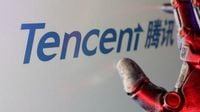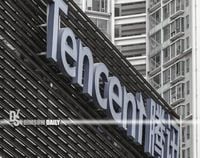SHANGHAI: Chinese tech giant Tencent officially launched its T1 reasoning model on Friday night, March 21, 2025, a strategic move that amplifies the ongoing rivalry in China's fast-evolving artificial intelligence (AI) landscape.
This upgraded T1 model introduces faster response times and improved capabilities for processing lengthy text documents. Tencent highlighted in a post via its official WeChat account that this new model keeps the content logic clear, ensuring that the text presented is neat and organized. Remarkably, the hallucination rate—the frequency of AI-generated inaccuracies—has been reported to be extremely low.
The timing of this launch is crucial, as competition is intensifying in the AI sector, especially following the introduction of DeepSeek’s models, which are reported to provide performance levels rivaling those of Western systems but at significantly lower costs.
Prior to this launch, Tencent had released a preview version of the T1 model through platforms, including its AI assistant application called Yuanbao. The officially launched version is powered by Tencent’s Turbo S foundational language model, unveiled in February 2025. This foundational model reportedly enables Tencent’s T1 to process queries more swiftly than the rival DeepSeek’s R1 model. A comparison chart published by the company indicates that T1 outperforms DeepSeek R1 in several knowledge and reasoning assessments, a testament to its advanced capabilities.
In recent months, Tencent has ramped up its investments in AI. On Thursday, March 20, 2025, the company announced plans to increase its capital expenditure in 2025, reflecting aggressive AI spending throughout the past year.
Meanwhile, Manus, a homegrown startup, is also making headlines in the Chinese AI sphere. On the same day that Tencent announced its T1 reasoning model, Manus registered its China-facing AI assistant and debuted on state television, marking a significant milestone for the company. This coverage signals Beijing’s strategy to support domestic AI firms that gain international recognition.
Manus recently gained viral attention on social media platform X for claiming to release the world’s first general AI agent, designed to make independent decisions and execute tasks with far less prompting compared to traditional AI chatbots like ChatGPT and DeepSeek.
Beijing appears poised to support Manus's efforts within China, reflecting a strategy similar to its favorable response to DeepSeek’s success. Following this trajectory, state broadcaster CCTV featured Manus prominently, showcasing a video that differentiated its AI agent from DeepSeek’s chatbot offerings.
In a further boost for Manus, Beijing’s municipal government confirmed that a Chinese version of its earlier AI assistant product, Monica, had completed the necessary registration for generative AI applications. This achievement clears a significant regulatory hurdle for the company.
Chinese regulations require that all generative AI applications adhere to stringent guidelines, ensuring that the products do not generate content deemed sensitive or harmful by the authorities.
Recently, Manus also announced a strategic partnership with the team behind tech giant Alibaba’s Qwen AI models. This partnership may facilitate the expanded rollout of its AI agent, which currently remains available only to users with invite codes and is experiencing a hungry waiting list of 2 million individuals.
As the AI sector in China continues to grow and evolve, companies like Tencent and Manus are at the forefront of innovation, unveiling technologies that not only enhance consumer experiences but also highlight the fierce competition among local and international tech giants.
The latest developments illustrate a rapidly changing landscape in artificial intelligence, where advancements are being rolled out to meet growing consumer demand and expectations for more sophisticated AI solutions.





